This may not sound possible, but way back in the eighties I built an above ground swimming pool at a home that didn’t have electricity. I remember it well. Using just a map, I drove way out to the other side of Lake County to a small house that looked like a shack. I had the best map you could buy and it still didn’t have all the streets on it, but I was good at finding places. It seemed to me that I was always building pools way out in the boonies. And it was always the last house on the right. As you can imagine, this place was way out in the middle of nothing.
When I arrived, I was still unaware that they had no electricity and started asking the standard questions of where did they want the pool and where did they want the pump and filter. “Pump and filter?” my salt-of-the-earth customer asked. He didn’t know what I was talking about as he just went to Rec Warehouse in Orlando and bought a swimming pool. He had no idea that a pool has to have a pump and filter. After I explained it to him, he of course wanted me to install the pool anyway and said that he would just have to figure it out later. It was only a 15’ round pool so we built it pretty quickly complete with its pump and filter pack and the pump’s cord that had nothing to plug into and we were soon on our way back to Orlando. In the eighties, electricity only came from overhead power lines and during the drive back I noticed that there were no lines going to some of the other houses and realized that my customer wasn’t the only one without electricity. Sounds crazy, huh?
For a few years after that and whenever I was way out in the boonies, I would pay attention to power lines and how they wouldn’t always reach all the homes. It’s almost unbelievable to think that there were homes as recent as the eighties in Florida that had no electricity. If I hadn’t seen it for myself, I wouldn’t believe it. Now of course electricity is everywhere. And if you are going to get a pool, you’ll need electricity. Here’s an idea of what you’ll need.
Whatever It Takes
Above ground swimming pools come with above ground pool pumps. I say this because pumps for in-ground pools are a little different. The two big differences are above ground pumps cannot draw water upward and that above ground pumps come only in 120V (volt) as they are not what is called “dual voltage”. Since pumps for above grounds only come as 120V, they all have standard three-prong plug cords attached to them. So due to these pumps having standard cords on them, the easiest way to get power to your pool is to use an extension cord connected to some outlet from the house.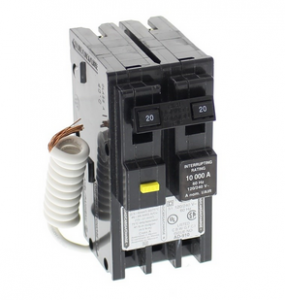
I recommend only using an extension cord temporarily until you can have a permanent power line buried that runs to the pump. Many only use an extension cord as theymay not have the money to do it right. If this is the case for you, then use an extension cord that has at least a #12 gauge wire. You really want a #10 gauge, but these cords are pricey. You want a thicker extension cord, because a pool pump requires a good amount of electricity to run. So, if the wire in the extension cord is too thin then the cord can eventually burn up or overheat causing the pump not to run. Also, because the pump uses a lot of power, the outlet that you plug the extension cord into should be on what is called a “dedicated circuit”. What’s that? A dedicated circuit or line or outlet is one that only goes to one place/outlet from the electric box. This means the outlet isn’t connected to other outlets or things that might use some of the electricity coming from the power source (box). Your pool pump is greedy. It’s going to want to have all the power available in the wire. If it shares the electricity with something else, it may cause the breaker to throw off. At that point, nothing will work until you turn the breaker back on in the electric box and that’s scary. Well, not too scary.
The Right Way to Power Your Pool Pump
So let’s say you can afford to get the proper power line run to the pool’s pump. What now? Well, if you are having an electrician do the job then he’ll figure out what he needs and may ask you to give him the requirements for the pool’s pump motor. He’ll then come out and see where your electric box is at your house and where the pump is and then depending on how much digging he has to do, will charge you accordingly. He’ll take it from there and all you’ll have to do is pay him and you’re done.

Doing It Yourself?
Here’s a list of what you need to know:
- At least a basic knowledge of electrical work
I don’t need to tell you that electricity is scary and dangerous. If you don’t know enough about it, then satisfy your DIY urges elsewhere. Work some overtime and pay someone to do this.
- Find out how many amps the pool pump needs
Amperage is the amount of electricity that runs through the electric wires. You need to know this for two reasons. One is so you can know what size breaker is needed at the electric box and the other so you know what size of wire to run to the pool’s pump. A typical above ground pool pump will require a 20-amp breaker and use #12 gauge wire to deliver the electricity.
- Does your swimming pool have any other electrical needs?
Your swimming pool equipment may have other needs for electricity. Add-ons like ozonators, ionizers, and salt chlorine generators require electricity. These add-ons usually don’t use much electricity so you won’t have to upgrade the breaker and wire size needed for the pump. If these add-ons are made for above grounds then they usually have standard three-prong plugs so you want to make sure there is an outlet for them. Above ground pool lights will also need an outlet.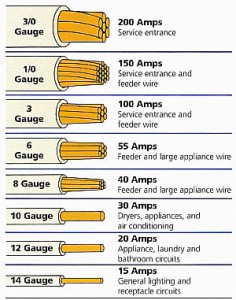
- Follow the NEC codes
I’m not one who always follows the rules, but when it comes to electricity it’s a really good idea. NEC is the acronym for National Electric Code and it can be found online or by calling your local building department or talking to an electrician. The NEC will tell you things like how far down to bury the wires, the wire size, breaker size, which weatherproof outlet to use, and grounding requirements.
- Consider getting a timer
You’ll thank me later. Most above ground pool packages don’t come with pump timers. If you don’t have a timer, you or someone you consider responsible will have to turn the pool pump on and off every day as the pump needs to run daily. A timer will do this automatically. Believe me, getting a timer is worth the extra money and hassle.
The electrical component of an above ground swimming pool is pretty important. If you have a budget, don’t cut your corners here. If you have to, don’t buy that fancy float that holds four beers so that you can get your electrical work done right.
If you have any questions on your above ground pool services then we would be happy to help, feel free to give us a call at 1-877-372-6038 or email us at upload@inyopools.com If you liked this article then make sure to sign up for Blog and get our Free 128 Page Pool Care Guide.

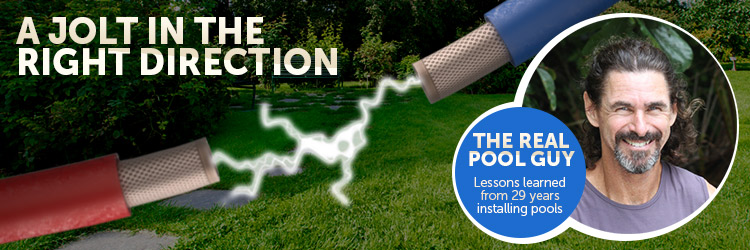
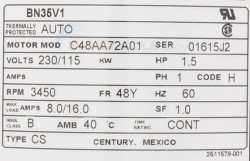
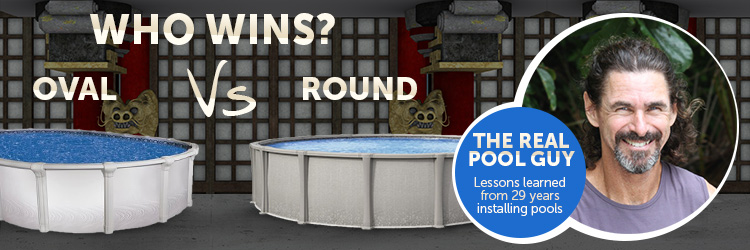


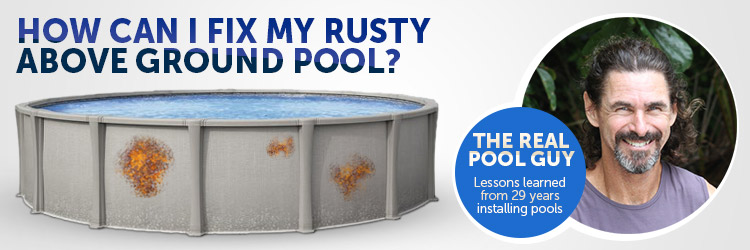






i just got a aquapro pool pump and a hayward chlorinator 120 v each and the are regular plug but the code in my town requires me to have a twist look in both , is there a way where i can replace them with the new cord and if so where can i buy it.
I just brought an above ground pool with a filter, krystal clear model 604 filter pump 220 – 240 V 50 HZ 45 W. Can I plug this into a 110 outlet
My pool requires a 30amp dedicated line. Do I install a 30amp gfci or a gfci outlet or both or neither?
What does your local code state? Inground pool pumps are generally hardwired, so a GFCI breaker would suffice. If your local code requires something else, follow the code.
My question is can I safely use a heavy duty (10 or 12 guage) extension cord to run my intex sand pump for my 24×52 intex above ground pool safely, IF I unplug it completely before anyone gets in the water? Sorry if this is not a good question, but I don’t understand the electrical technicalities.
Do you have the manual for the pump? Or can you look up online the manual of the pump using the model information? If so, there should be electrical guidelines, i.e. cord gauge and length of extension cords that are compatible.
Yes I have the manual and I’ve got the correct size extension cord, but I just wondered if it is still safe even if we unplug the pump every time we get in the water. Would there still be electricity built up in the water if a short or some other malfunction had occurred without us knowing? I’ve been unplugging it before we swim but after reading thru some of these comments and article, I became concerned that we still may have chance of electrical shock. Thank you for your time Matthew! 🙂
New pool installed fixing to run electrical. Pool is approximately 125 ft from electrical box. I realize 20 amp breaker and 12/3 wire will work but since it’s so far away do I need to do a 30 amp breaker and 10/3 wire to account for droppage?
Question
I have a hayward above ground pool pump on a 20 amp breaker unfortunately when the put the electric in for the pump they ran it to short , and I have to buy a short 3′ 8ga extension cord that runs between the pump and the outlet , the problem is the pump keeps blowing the 20 amp GFCI fuse on my home fuse box and usually I just have to reset it , but last year it would not reset , found out that the plug going into the outlet was a little looser fitting then normal and allowed it to wiggle and cause a bad connection and blow the breaker, I switched to the other receptacle and it ran fine the rest of the year , well again this year it ran fine for awhile and it started doing it again , the pump would run for two minutes or so and then would blow again , so I believe the same thing is again happening , but know I dont have any receptacles left on my box, and I think its because of all the thermal changes those switches and plugs go through causing the connection to go bad, my question for this long explanation is what can I do long term to fix this problem and keep it from happening year after year
The beginning of your question starts with the improper wiring during installation. I would correct that problem so you do not have to use a receptacle. Or you can replace all your receptacles so you can begin the cycle again.
I just had a pool put in and it’s set up on salt water and has a 2 hp motor that plugs into a pool chlorine generator. The pump amp draw is max 11.5 and what I did is set a 4×4 in the ground and also put a steel rod in the ground next to the pole drove it into the ground some and the put some concrete in hole. I run a 10 gauge ground wire from the pump to the steel rod the to the ground lug on the chlorine generator. I bought a 15 amp GFCI receptacle to mount to the 4×4 and it’s about 20 feet from garage wall and I have an outlet in the garage that I thought I could run 12 gauge off that receptacle and bury in tubing from the garage to the GFCI Receptacle on the 4×4. There is a 20 amp circuit breaker for all the garage receptacles. Does this sound ok to do? I’m running the pool off a extension cord that has 10 gauge wire to a GFCI receptacle on the back wall on our deck.
Can i use a generator to run a pool
Yes
I made a 8×2 stock tank pool 650 gal of water and a summer wave 1000 pool pump can I bury 8 ft of the pump cord in a PVC pipe avoiding my dog tripping over it in the yard then the rest of the cord gets plugged into a covered gfci outer is this ok
I was under the impression I could run 14/2 wire on a 15 amp circuit if it’s only 115v pump?
Also, how deep should I bury my circuit from the pump to the house, and do I need to put it in pvc?
My abg is about 100 feet from my breaker panel. Do I need a disconnect switch between the pump outlet and the panel?
Also 1 hp converts to 745 watts. watts divided by voltage(120v) = Amps… this is where you get your wire size 14gage 15 amps 12gage 20amps .. that’s it simple..
Hi Dan I had an electrician come out to give me an estimate on electrical work for my new above ground pool. He mentioned putting in a copper ring around the pool and connecting that to each support pole on the pool then back to the pump. Is this type of grounding really necessary? I feel I’m being taking advantaged of. He quoted me 3,117.00.
I am in the same boat as you. I heard that as well and we are planning on an above ground pool soon. I never heard of this but would be interested to see what he has to say. That sounds like a lot of money.
Yes this is required by the national electrical code. also is to be inspected by a wire inspector. the motor is to be grounded the pool is to be grounded in four areas with a #8awg bare wire making a circle around the pool. also the water is to be bonded. all this will be tied into your ground of your plug that has to be a twist lock and with a extreme duty cover 5′ with a switch/disconnect/time clock from your pool. you will also need to have a service receptacle 6′-20′ from your pool. also remember gfci protection. Note trenching holes can cost money. dig the holes yourself and save some.
I don’t think it is necessary mainly because I’ve only seen thousands of above grounds without grounding and they are fine. Grounding is a weird topic though. One whose opinions are mostly theoretical. Don’t go with the added expense. Have a pool party instead with the money. A big one.
It isn’t “grounding”, it is “bonding”. Very important. Yes, there are a lot of pools installed without bonding being installed properly. Most pools will never have an issue and it will seem like it wasn’t needed. The reality is when there is an electrical fault or difference in potential it can become deadly. There are at least a few every year. https://www.desertsun.com/story/news/local/palm-springs/2016/03/28/palm-springs-pool-electrocution/82360592/ . Google Pool electrocution and you will find many articles. GFCIs and proper bonding can prevent these accidents. It is vital to do proper bonding and may save your life or someone’s you love.
Will a 50ft 14 gauge extension cord work for a swimming pool pump
That is dependent upon the HP of the pump. What is HP your pool pump? Also, is this running on 115 or 230 volts?
Only for the super cheap Intex pumps that don’t draw much electric(or much water either). Real above ground pumps need at least a 12g cord.
One thing which is essential for any outdoor installation or where there is water is an earth leakage breaker. Over in the UK we call them RCD (Residual Current Device) and I recommend a 30mA unit.
They work by comparing the live and neutral currents in the cable and immediately disconnect the power if they are not the same. This will prevent you being killed by electrocution as a result of a fault in the pump or other pool wiring because some current will flow to earth through the equipment or yourself resulting in an imbalance in Live and Neutral. The RCD will detect this and immediately switch off the power before you are injured. Note that a RCD will not protect you if you shove your fingers into both the live and neutral power connections but it will protect you from most other conditions.
If you are using a generator then you should use a ground rod to ensure that the system is properly earthed and to enable the RCD to detect faults.
I don’t know that I’d call it essential as I have done outdoor installations for three decades and have never seen or heard what you are talking about. Maybe the UK has man-made electric current running through the ground water, But not here in the US. Our building codes are pretty good though. Some of the best in the world, I’d say.
I’d never heard of an RCD either–Google and Wikipedia say it’s another name for GFCI.
My AGP is about 4′ from the back wall of my house right outside of the basement. The panel is about 30′ away towards the front of the house. My question is, is it ok to run my wire through the joists and through the back wall to an outlet i’ll install on the back wall?
Yes. there are electrical wires running through most attics.
I have a filter pump and a saltwater system both with gfi cords but only have one outdoor outlet. Both want fit in same outlet. Can I use extension cord for one? And is it safe to have both in same outlet
If the outlet is on a “dedicated circuit” then you can use it for both. You may be able to use it for both regardless as the chlorine generator typically doesn’t use much electric. And it is safe as long as the outlet has a Gfci (or Gfi as some call it). I’m not sure on cords with them built-in though.
How do I ground pool or does it have to be
Yes, if you want safe pool equipment, ground or use a bonding wire. Step 10 on this guide explains how to bond a pump motor: How To Wire A Pool Pump
If the breaker is 20 amp does the gfci need to be 15 or 20 amp?
Breakers have a GFCI built-in, at least most that I have seen. But if you have a separate GFCI, get one that matches your breaker amp rating.
Do you have to plug the pool pump into a gfi plug
I’m running underground wire to my pool pump which is a 2hp. will the 12/2 type uf-b wire be good? pump is roughly about 60 feet from the panel
Speak to your township official. direct burial depth is often different from conduit depth. Also, Most require thhn thwn wire. Many towns require a separate GFCI service outlet too and pool location distance from boundaries needs to be adhered to. Also, YOUR fence must surround the yard or pool (if you share a neighbors fence along a side, that doesnt cut it with most towns) and conduit proximity to pool necessitate a call to the town. Your 2HP circuit would be 220Vac so the 12 gauge would work… However, if you have future plans in the area like lighting maybe consider putting in a outdoor subpanel. Its all very easy for a diy-er and you’ll save a lot of money,,,if you are nervous, find a friend with electrical understanding for that part. Definitely ask for a consult with your towns electrical inspector because electricity (natural and home powered) is serious stuff when people are in a pool
Thank you sir for your wealth of information!
Matthew, you replied to my post on August 10,but your pump motor wire gauge guide does not display? Can you format differently or provide a link please? This was my original post. My pool pump will be located approximately 175 from service panel. Will a 1 hp pump be sufficient with a 20 amp circuit and 12 g wire for a 28ft pool.
Thank you!
Sorry about that. Here you go:
Still having trouble, link is not working
Did you every get a response, because the image he’s sending is not showing up in this thread.
Could a generator be used instead of an extension cord?
A generator could be used in place of an extension cord, but the engine sound and gas fumes could dampen pool fun for swimmers.
Can I use a Honda generator to run the over ground pool pump and if so is a 2000 ok ?
As long as the generator’s watt output is great than the pump’s need, then it should be fine.
ifyou use a generator it must be grounded to your house plumbing or a 10 ft grounding rod drove on the ground about 9 feet
I’m not at all sure what you mean. Why do think you need a ground rod? Need more info. Sorry.
Pls I have a contract to do electrical piping for swimming pool and this my first time to do this work. Pls I need help. Thanks
Dampen pool fun for swimmers? You are so punny! 😉
My pool pump will be located approximately 175 from service panel. Will a 1 hp pump be sufficient with a 20 amp circuit and 12 g wire for a 28ft pool.
Thank you for the info…Question: Would a 3/4 horse pump at 45 feet need a 12 gauge wire?
If you are running the motor on 115 volts, 12-gauge would work fine.
Can a 14 gauge work?? On a game sand pro 3/4 hp pump
What is the amp usage on the motor label? Also, what is the distance between the light source and the pump?
14 gauge extension cord? Probably not.
I am wondering I have a electrical line in my back yard they put it 4ft below ground level inside of conduit and grounded can I put a above ground pool over it and access points on either end is at least 15ft from where pool is going to be located
My first guess would be, no you can’t. But you probably want to check local codes to determine if that is allowable in your area.
Ok, got IN ground pool, 2hp motor, 98ft from breaker box. Is 12/2 on a 20 or 25 amp breaker work?
What voltage are you using, 115 or 230?
What type of outlet do I need
Above ground pool pumps are usually wired with a 3-prong or a twist-lock cable. WHichever you use is determined by your preference or whatever you have onsite.
Can I put an above ground pool by the electric meter that’s on the house
What kind of distance are you talking about?
How long is the extension cord coming off the pool